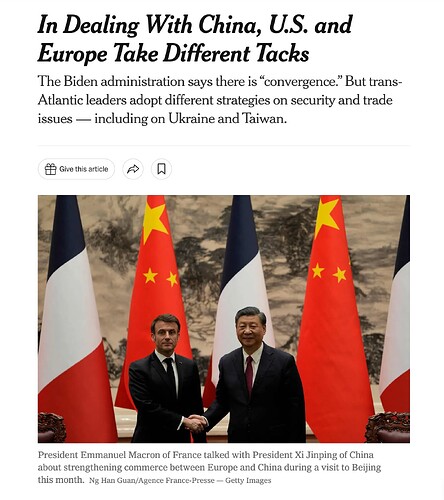-
这篇文章谈到了美国和欧洲在对待中国问题上的差异。
-
众议院议长凯文-麦卡锡向台湾总统蔡英文承诺,美国政府将支持这个事实上独立的岛屿对抗来自中国的持续威胁。与此同时,法国总统埃马纽埃尔-马克龙和欧盟委员会主席乌苏拉-冯德莱恩敦促习近平主席让俄罗斯结束在乌克兰的战争,同时还谈到了加强欧洲和中国之间的商业。
-
美国和它的欧洲盟友在许多全球问题上有着相似的观点,俄罗斯对乌克兰的入侵拉近了他们的距离。在中国问题上,欧洲官员正采取越来越多的怀疑态度,向华盛顿形成的强硬派共识靠拢。然而,欧洲在对中国的正确态度以及平衡安全和贸易问题上仍有争议性的辩论。
-
拜登总统和他的助手们谴责中国与俄罗斯的结盟。马克龙先生尝试了一种不同的方法,而冯德莱恩女士则对中国发表了比马克龙先生更严厉的声明。马克龙先生带着50名法国企业高管来到北京,这显然是为了加强商业关系。一些欧洲分析人士批评这些领导人带着商业代表团,认为这向中国发出了错误的信息。
-
西班牙首相佩德罗-桑切斯在北京会见了习近平先生,并敦促他与乌克兰总统沃洛季米尔-泽伦斯基交谈,而习近平先生一直回避这样做。如果中国继续采取侵略行动,欧洲有可能对中国采取更强硬的态度,包括限制贸易。欧盟可能会取消它在2020年与中国达成的贸易协议,作为 "经济去风险化 "的一部分,以便与美国的观点保持一致。
-
拜登政府已经推动欧洲政府对关键技术采取更多保护措施,荷兰承诺限制向中国销售一些半导体制造设备。由于中国在允许台湾开设代表处后对立陶宛进行经济处罚,以及欧盟宣布对试图在经济上胁迫欧洲的国家进行贸易处罚,欧洲领导人在中国问题上变得更加接近美国的路线。台湾是美中关系中最大的热点,拜登政府和两党的立法者都对台湾表示支持。
-
欧洲参与了关于台湾的军事行动和声明,北大西洋公约组织专门就台湾问题进行了讨论,七国集团也发表声明,呼吁维护 “台湾海峡的和平与稳定”。德国教育部长贝蒂娜-斯塔克-瓦茨格成为26年来第一位访问台湾的德国内阁官员。美国应该专注于建立自己的军队,以阻止任何潜在的中国对台湾的入侵,并加强该地区盟友的能力,特别是日本和澳大利亚。然而,一些美国外交政策思想家对欧洲国家是否会在台湾冲突中向美国提供强有力的军事支持,或愿意对中国实施严厉的经济制裁持怀疑态度。
-
House Speaker Kevin McCarthy promised President Tsai Ing-wen of Taiwan that the American government would support the de facto independent island against constant threats from China. Meanwhile, President Emmanuel Macron of France and Ursula von der Leyen, the head of the European Commission, urged President Xi Jinping to get Russia to end its war in Ukraine, while also talking about strengthening commerce between Europe and China.
-
The United States and its European allies share similar views on many global issues, and Russia’s invasion of Ukraine has brought them closer. On China, European officials are taking an increasingly skeptical view, moving closer to the hard-line consensus that has formed in Washington. However, there is still contentious debate in Europe over the right approach with China and over balancing security and trade issues.
-
President Biden and his aides have denounced China’s alignment with Russia. Mr. Macron has tried a different approach, while Ms. von der Leyen has made harsher statements on China than Mr. Macron. Mr. Macron brought 50 French business executives with him to Beijing in an obvious effort to bolster commercial ties. Some European analysts have criticized the leaders for bringing business delegations, saying that sends the wrong message to China.
-
Prime Minister Pedro Sánchez of Spain met with Mr. Xi in Beijing and urged him to speak with President Volodymyr Zelensky of Ukraine, which Mr. Xi has avoided doing. Europe has the potential to take a harder line on China, including limiting trade, if China continues its aggressive actions. European Union might cancel a trade deal it reached with China in 2020 as part of “economic de-risking” in order to align with views in the United States.
-
Biden administration has pushed European governments to take more protective measures on critical technologies, with the Netherlands committing to limiting sales of some semiconductor manufacturing equipment to China. European leaders have become closer to the American line on China due to China’s economic penalties on Lithuania after allowing Taiwan to open a representative office, and the European Union announcing trade penalties on countries that try to coerce Europe economically. Taiwan is the biggest flashpoint in U.S.-China relations, with the Biden administration and lawmakers from both parties showing support to Taiwan.
-
Europe has taken part in military actions and declarations on Taiwan, with the North Atlantic Treaty Organization dedicating a discussion solely to Taiwan, and the Group of 7 nations issuing statements calling for preserving “peace and stability across the Taiwan Strait”. Education minister of Germany, Bettina Stark-Watzinger, became the first German cabinet official to visit Taiwan in 26 years. U.S. should focus on building up its own military to deter any potential Chinese invasion of Taiwan and bolster the capabilities of allies in the region, notably Japan and Australia. However, some American foreign policy thinkers are skeptical that European nations would give robust military support to the United States in a conflict over Taiwan, or be willing to impose harsh economic sanctions on China.
